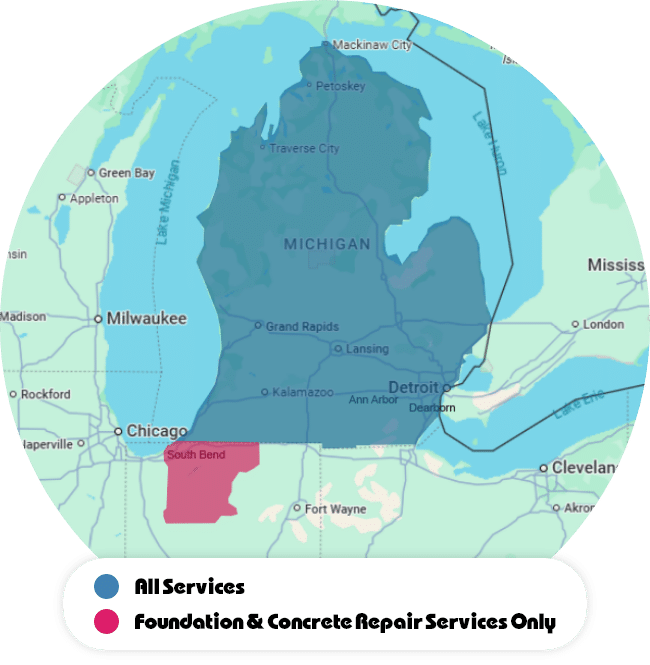3 Signs of Foundation Problems - How to Get Your Home on Solid Ground
Have you ever felt like your house is just...off? The windows are sticking, it takes a little extra heft to get the front door shut when you leave for work in the morning - something is wrong.
That something could be your foundation.
It’s difficult to think about your home’s foundation in anything but the abstract. It’s just there, holding up the house - what could go wrong? Unfortunately, the answer is “a lot” could go wrong, and if not addressed promptly, these problems could have disastrous consequences. “Wall collapsing into your basement” consequences.

Luckily, there are signs of foundation problems in the phase between “everything is fine” and “my garden is in my basement,” and we have a myriad of solutions to stabilize, straighten, and lift your foundation to ensure it’s safe and secure. Here’s what to look for:
1. Sticking Doors and Windows
If opening the windows in your home has replaced your gym routine, there’s a good chance your foundation is to blame. As your foundation shifts, whether it’s due to a bowing wall or sinking slab, everything above it also shifts. This means the walls of your home can go out of alignment and take the door and window frames with them, leading to the sticking you’re probably familiar with.
2. Cracks and Gaps on Walls
The walls in your home are actually a great source of visual identifiers for problems below ground. Like I said above, when the foundation shifts, it moves the walls with it, and problems with finishes can be a great indicator that something is going on. We recently did some foundation work on a home that had textbook signs of problems throughout their home.
Diagonal cracks from door frames are a sign that the foundation wall below is sinking. The stress of losing support from below while still being held up from above causes cracks to form in drywall in the archways.
Baseboard and trim are another place to look for visual confirmation. When your foundation sinks, the floor tends to go with it. But baseboard is nailed to the wall at the original floor level, so it stays in place; the result is a gap between the floor and the bottom of the baseboard. Similarly, if a wall is shifting with the settling, the ceiling trim will attempt to pull away from the ceiling and either peel away the drywall facing or leave another gap. These kinds of gaps really apply anywhere something is affixed to a wall, like a countertop in the bathroom or kitchen, and are a major sign that the walls are moving and settling.
Below ground, cracks also appear as an indicator of foundation problems. Block walls will present stair step cracks while poured walls will generally have horizontal cracks running across them. These cracks can be independent or in conjunction with bowing walls.
3. Slanted Floors
This is the most obvious one, but it’s still worth mentioning. If your desk chair keeps rolling across the floor, or you have to prop up one side of the entertainment center to compensate for the tilt in your living room, it isn’t quirky or charming; it’s dangerous.
When your foundation shifts, it sets into motion a series of potentially serious events throughout the house. If the slab settles, the entire house can get thrown off-kilter, and if a wall bows either due to aforementioned settling or even soil shifting and causing pressure, the change in balance can lead to wall collapse.
We have a variety of wall anchoring products that can be affixed to bowing or slanting walls and tightened over time to not only stabilize and secure against further bowing, but also potentially straighten the walls to their original position.

In the event that your stone foundation is crumbling apart, we can use Shotcrete to literally build new walls in place and stabilize your foundation without having to undertake the costly and dangerous process of lifting your home and pouring new walls.

If the problem is your foundation slab sinking from soil erosion, we can use helical or push piers to stabilize and hopefully lift the slab to its original position and guarantee against future sinking by shifting the weight of the home to the pier instead of the unstable soil.
Foundation problems are no joke, and what seems like a small crack or a slight slant can be indicators of something major happening underground in your home. With gravity and the weight of your home in play, these issues only get exponentially worse as they’re ignored, so it’s best to have us out for a free inspection as soon as you notice one of the above signs. We’ll design a solution that will make your house safe and secure.











